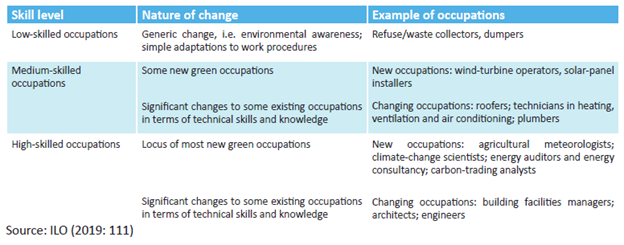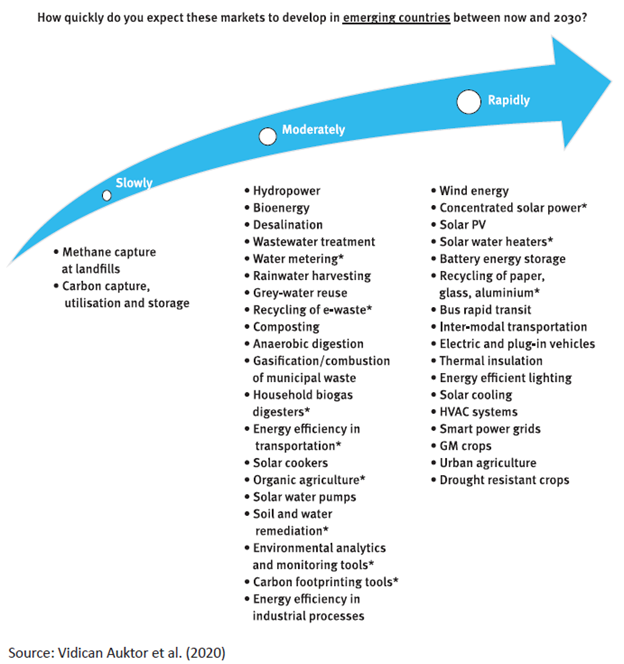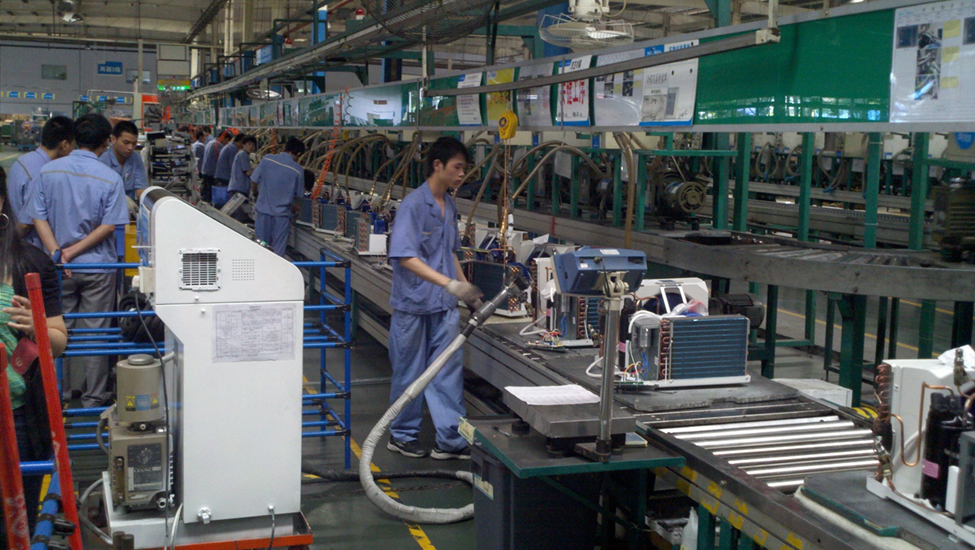As a result of the greening of the economy, many existing occupations will have to adapt their skills (Bowen et al. 2018) to align their operations to new markets and business models. According to the World Economic Forum, companies estimate that by 2024 around 40% of workers will require reskilling to ensure the continuation of their business. Furthermore, a greater private-public collaboration on upskilling and reskilling initiatives could boost global GDP by $6.5 trillion and lead to the creation of 5.3 million net new jobs by 2030. Appropriate and new skills (i.e. green skills) are required to create and apply green technologies in diverse industries to enable and assist this process.
A UNIDO’s flagship program on skills development include reskilling and upskilling initiatives in the refrigeration and air conditioning (RAC) sector. Likewise in all other industrial sectors, skilled employees generates increases in the productivity of labour forces and make investment in industry more attractive. This contributes to sustained employment, higher wages and decent jobs. More specifically in the RAC sector, skills and expertise are also a matter of safety. Technicians do not only need to be able to install, operate and maintain cooling solutions running on alternative and more sustainable refrigerants, but they also need to understand what materials they are working with and master tools, technologies and techniques to keep themselves, other people, and the planet safe[1].
Training and upskilling are therefore crucial components in the refrigeration industry: they not only help to develop the scientific knowledge, the technical skills and create jobs, but they are also a fundamental step in phasing out HCFCs and phasing down HFCs by replacing them with environmentally natural alternatives, such as CO2, hydrocarbons and ammonia. Service technicians play an important role in keeping cooling systems running in our houses, particularly smaller units in low-income households. Therefore, the need for qualified and upskilled technicians in the servicing industry that are trained by qualified professionals is more urgent than ever. Providing upskilling not only gives technicians the skills to improve their services, but it also improves their job opportunities.

Greening the economy’s employment consequences
One of the major aspects of decarbonisation-related employment implications is the type of occupations that would be affected. According to Chateau et al. (2018), low-skilled occupations account for the majority of job creation and destruction at the global level, whereas high- and medium-skilled labor[2], such as technicians in heating, ventilation and air conditioning (HVAC), accounted for the majority of net job growth.[3]
According to the ILO (2019), new (green) occupations tend to emerge at higher skill levels (especially challenging for developing countries facing skills shortages at this level), requiring re-skilling, whereas lower-skilled occupations may only require simple adaptations (i.e. upskilling) and increased environmental awareness.
The figure below depicts the changes in skills levels as a result of the green transition. Because of the major changes that will be necessary in terms of technical skills and knowledge, occupations such as technicians in HVAC will undergo a shift in skills as a result of the green transition.

Future trends in green technology adoption and their implications for skills
Vidican Auktor et al. (2020) found substantial variation in green technology diffusion rates in developing and emerging countries. The figure below depicts the expected trends in market development for selected green technologies in emerging economies. In general, all green technologies are expected to expand moderately to rapidly in emerging economies. It is important to note that markets for HVAC systems and renewable energy technologies are expected to grow significantly in developing countries in the coming decade and therefore the need to invest in a skilled workforce that is able to safely operate and maintain these technologies will be significant.

A green workforce for the green transformation
To support the green transformation, it is crucial that workers have the appropriate skills to meet such industrial demand. According to the recent UNIDO’s Learning and Knowledge Development Facility (LKDF) study[4], the process of greening the economy is expected to have important effects on labour markets worldwide. As the pace and diversity of green technology dissemination will grow in the coming decades, new markets will emerge and ultimately the demand for green jobs and related skills will increase (Auktor, 2020).
Reskilling and upskilling the workforce through skills development programs is key for a successful green transformation. However, policy-makers face several challenges to effectively address what skills are needed for greening the economy. Not only is the future unknown regarding how these global trends will develop and reinforce each other; the transition to a green economy is itself unique given its cross sectoral effects, deficit of precedent, and therefore lack of best practices to draw upon. Thus, learning, experimentation, and foresight in policy design and implementation are crucial.
UNIDO’s LKDF offered a set of guidelines for increasing the effectiveness of green skills development programs that could, for example, increase the number of trained and certified technicians on natural alternative refrigerants and positively contribute to the cause against global warming. Such guidelines are relevant not only for the public sector developing strategies and specific policy interventions, but equally important for the private sector playing a central role in the green skills development process, development cooperation actors, trade unions and civil society. These are:
- Policy coherence between green skills development programs and other policy goals through a systematic process of stakeholder consultations: Through a systematic process of stakeholder consultations, policy coherence between green skills development initiatives and other policy goals may be achieved. However, it is even more critical to ensure policy coherence among ministries, industry associations and firms, training and education institutions, civil society, and other stakeholders, in order to ensure that policies implemented contribute to green jobs and enhance skills in green occupations, as well as being aligned with market needs. A structured process of stakeholder discussions is crucial to this objective. Green skills development initiatives are seldom integrated into national (or sectoral) development efforts, and most choices are made in silos (either in the public or private sector). Such consultation processes would also ensure that the private sector receives more guidance and support (financial, in the form of subsidies for training and re-skilling or favourable loans for investing in jobs-creating sustainable businesses, and sometimes technical) in identifying cost-effective greening options and aligning their actions with national greening strategies.
- Solid empirical base for green jobs and green skills: A strong empirical foundation is required for well-informed policy. Policymakers should collaborate with the private sector and prioritize the creation of comprehensive labour market information systems, agree on definitions, and use systematic mechanisms to identify where green jobs are (which sectors and types of occupations) and what skills are currently required.
- Systematic mechanisms for green skills forecasting: Anticipating future skills development demands necessitates significant capacities in forecasting green technology markets at the global and national levels, as well as commenting on such trends in light of existing local capabilities. As ILO (2011: 162) argues, skill-shortages for green jobs stem from several factors, such as an underestimation of growth in certain green sectors or a general lack of scientists and engineering or of teachers and trainers in fast-growing sectors. The public and private sectors must work together to develop capacity for conducting needs assessments and to financially support such initiatives.
- Coordination of goals and interventions across sectors and stakeholders: Without comprehensive coordination and consultation across ministries and with private sector actors (i.e. industry associations), trade unions, workers, education and training institutions, and societal groups, none of the above objectives (policy coherence, accurate measurement, identification and anticipation of green skills) would be accomplished. Given the cross-sector nature of green jobs, conversation and cooperation are even more vital in this setting than in more typical skill development initiatives. More particular, cross-stakeholder cooperation demonstrates that countries with well-established labor and environmental legislation, strong TVET institutions, and close involvement with the private sector have reacted to the increasing need for green skills significantly faster (van der Ree 2019).
- Increasing awareness on sustainability issues related to production and consumption of goods: Such activities are critical at all levels of education because they help to change behavior and generate demand for green technology and procedures.
- Monitoring and evaluation: Monitoring of inputs into skills development programs is just as crucial as monitoring of outputs. Because the labor market is always changing, not only due to economic fluctuations, but also due to rapid changes in technological development and dissemination, policy actions must be regularly monitored and calibrated/adapted.
Case study: Building a green workforce on alternative refrigerants and the UNIDO and Midea partnership
One of the most remarkable examples in the RAC sector is the partnership between UNIDO and Midea, the Chinese giant manufacturer of air conditioning appliances. China is the world’s largest producer of air conditioning appliances, producing around 70% of all room air conditioners, and with the fastest growing domestic market. This means that every HFC-based air conditioner sold has an environmental cost, posing a serious threat to our ecosystem. During the last 10 years, UNIDO has worked together with Midea to search for environmentally sustainable solutions for residential air conditioning and to make a contribution to global environmental protection together, sharing a vision to protect the environment.
Midea was the first manufacturer to partner with UNIDO and transition from HCFC-22, a powerful greenhouse gas, to R-290 (propane), a natural refrigerant with negligible GWP. Midea has invested more than 10 years in R&D and over 7 million USD for its product line. UNIDO supported Midea in redesigning their products and production lines with specific characteristics, especially in regards to the refrigerant’s flammability. Also the technicians that service these air conditioners had to be trained on how to safely install and maintain the new systems. In China, both Midea and the Chinese government provided the necessary training for this technology and UNIDO also supported high-level training of engineers and management to build confidence of the industry in this new technology. This project has phased out 13.2 tons of ozone-depleting potential and reduced 967,490 tons of CO2 equivalent emission per year, according to data from UNIDO.


This resulted in the recent introduction of this innovative product into the EU market. But this process is not as simple as it seems. R-290 (propane) is a flammable refrigerant that requires qualified technicians to be able to safely install, service and maintain these air conditioners. If we want to bring environmentally friendly air conditioners to the EU market and increase their uptake worldwide, we need to have trained engineers and technicians at local and global level and invest in their reskilling and upskilling. In the case of the EU, the number of trained and certified technicians on natural alternative refrigerants is very low (only between 3.5% and 7%). Already back in 2012, AREA (Air conditioning and Refrigeration European Association) alerted on the risk of shortage of trained technicians. Today, after 10 years, AREA is calling for mandatory certification, as the situation has not improved with a low number of trained technicians and a high demand for alternative refrigerant solutions. If we want to increase the uptake of this product worldwide, there is a need to develop and harmonize safety standards and to train technicians (reskill, upskill and set up new curricula) in the EU and worldwide on natural refrigerants and flammables to be able to safely handle this technology. This technology by itself could make a significant contribution to the fight against global warming by reducing it by 0.3 degree Celsius.
UNIDO and major manufacturers, including Midea, are working to increase the uptake of propane-based air conditioners and advocating for technicians to be upskilled on alternative refrigerants and flammables, both at the national and global level, to truly achieve economies of scale. There is still work to be done, but the journey thus far is proof that industry leaders have a key role to play in pioneering technologies for a sustainable future.
Conclusion
Greening the economy will inevitably change the skills required and the tasks involved in many of the existing occupations, including the ones in the RAC sector. Developing skills, knowledge, and competencies is therefore an important part of the transition to a low-carbon economy. Such skills enable the private sector and individual consumers to embrace and employ resource-efficient, sustainable processes and technologies (Cedefop and OECD 2015).
The key to unleashing the potential of each individual in our global community is education and continuous upskilling. Skilled people increase labor productivity and make industrial investment more appealing. This helps to ensure long-term employment, greater earnings, and quality jobs.

Karin Monaco

Franziska Menten
References
[1] Montreal Protocol and Beyond, UNIDO (2021), https://www.unido.org/sites/default/files/files/2021-04/Montreal%20Protocol%20Division%20Publication%20PDF.pdf
[2] High-skilled labor refers to ‘professionals’ and ‘managers and officials’, intermediate-skilled labor refers to ‘service and sales workers’ and ‘clerical workers’, while low-skilled labor refers to ‘blue collar and farm workers’.
[3] Similar results are also obtained by Cambridge Econometrics, GHK, and Warwick Institute for Employment Research (2011).
[4]“Green Industrial Skills for a Sustainable Future”, Georgeta Vidican Auktor (2020). https://lkdfacility.org/wp-content/uploads/LKDForum-2020_Green-Skills-for-a-Sustainable-Future.pdf
Bowen, A., Kuralbayeva, K., and E.L. Tipoe (2018). Characterising green employment: The impacts of ‘greening’ on workforce composition. Energy Economics, 72: 263-275
Cedefop and OECD (2015). Green skills and innovation for inclusive growth. Luxembourg: Publications Office of the European Union. Cedefop reference series
Chateau, J., R. Bibas, and E. Lanzi (2018). Impacts of green growth policies on labour markets and wage income distribution: A general equilibrium application to climate and energy policies. OECD Environment Working Papers No. 137. Paris: OECD
ILO (2019). Skills for a greener future: A global view based on 32 country studies. Geneva: ILO
ILO (2011). Skills for green jobs: A global view. Geneva: International Labour Office (ILO)
van der Ree (2019). Promoting green jobs: Decent work in the transition to low-carbon, green economies. International Development Policy, 11: 248-271. Retrieved from https://journals.openedition.org/ poldev/3107
Vidican Auktor, G. (2020), “Green Industrial Skills for a Sustainable Future”, https://lkdfacility.org/wp-content/uploads/LKDForum-2020_Green-Skills-for-a-Sustainable-Future.pdf
Vidican Auktor, G. Altenburg, T. and A. Stamm (2020). The transition to a green economy and implications on quality infrastructure. Study 102. Bonn: German Development Institute / Deutsches Institut für Entwicklungspolitik (DIE)
